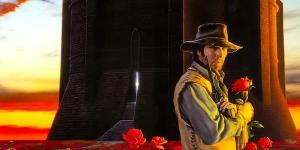The story stars with some verse, which feels very Scottish in its orthography:
King Arthur's sons o' merry CarlisleSo the sons of King Arthur are kicking a ball around, with their sister burd Ellen watching (burd just means maiden). When Childe Rowland kicks the ball over the church (here spelled "kirk"), Ellen goes to get it. Problem is, she doesn't come back. The boys (there are 3 of them) look for her in vain, finally learning from Merlin (Myrddin Wyldt) that she's been carried away by fairies to the castle of the King of Elfland. Merlin warns them not to pursue her without the proper care and instructions; namely, they have to kill everyone they meet in Elfland and avoid drinking or eating anything while they are there. In true folktale form, the first two brothers (when I tell this story to my kids, I name them Alan and Cuthbert) fail to obey these rules are are trapped in Elfland. Rowland follows, this time obeying the rules. He gets directions to the castle from various herdsmen, all of whom he decapitates with his "good claymore that never struck in vain" (here it seems to be called Excalibur, but that might be an interpolation; in the version in Jacobs' volume 1, it's called a brand--an old word for sword that we got from French, and from which we get the verb brandish).
Were playing at the ba';
And there was their sister Burd Ellen,
I the mids amang them a'.
Rowland gets to the hill upon which the castle sits. To get inside, he has been told by a hen-wife who now lacks a head, he must go around the hill three times widdershins and repeat "Open, door! open, door! and let me come in." Widdershins means counter-clockwise, or the way opposite the path of the sun, and is the way to walk around a church if you want to get to Elfland or Faerie or whatever magical place suits your fancy.
So Rowland's inside, and he sees a magical castle that's described in some detail, which I won't go into here. He finds burd Ellen sitting on a velvet sofa. They talk of what has happened, but burd Ellen can't say much. When he confesses to great hunger, she keeps quiet but brings him food. Luckily, Rowland remembers Merlin's advice and doesn't eat it. Then comes the King, chanting,
"With fi, fi, fo, and fum!There follows a great battle between Rowland and the King. (Harns, by the way, are brains, so harn-pan is head; and there's brand again.) Rowland proves victorious, and convinces the King to free his brothers and his sister. They return home.
I smell the blood of a Christian man!
Be he dead, be he living, wi' my brand
I'll clash his harns frae his harn-pan!
I've been more interested in this story since I came across another reference to it in King Lear not too long ago. In that play, the character Edgar is pretending to be mad, and so he deliberately confuses lines from different fairy tales--"Childe Rowland" and "Jack and the Beanstalk." It's interesting that, two hundred years later (or so) this Scottish version of Childe Rowland makes the same conflation, with the King of Elfland saying the lines of the Giant.
As for the curious word childe...the OED tells us that it's a reference to a highborn youth who is supposed to become a knight. Jacobs in the article linked to above tells us that it refers to an heir. In that sense of the word, he finds evidence that the story dates from an earlier age during which the youngest son was the primary heir to a family's estate. Make of that what you will.
So why is this one of the best stories in the world? I'm a bit biased, since I named one of my sons Roland (which means "famous" in French).


No comments:
Post a Comment
Note: Only a member of this blog may post a comment.